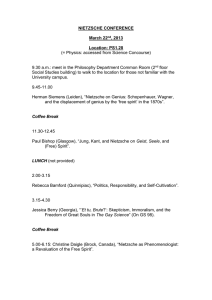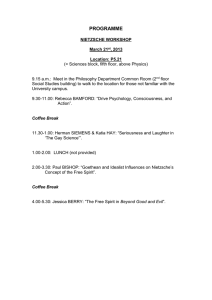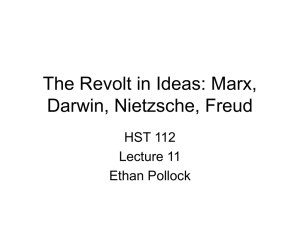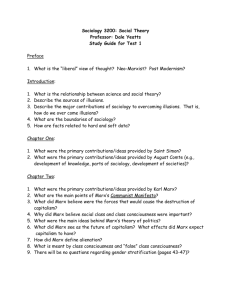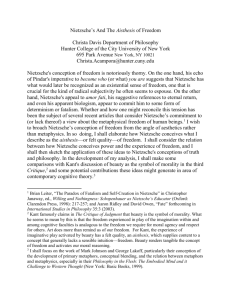Marx and Engels
advertisement
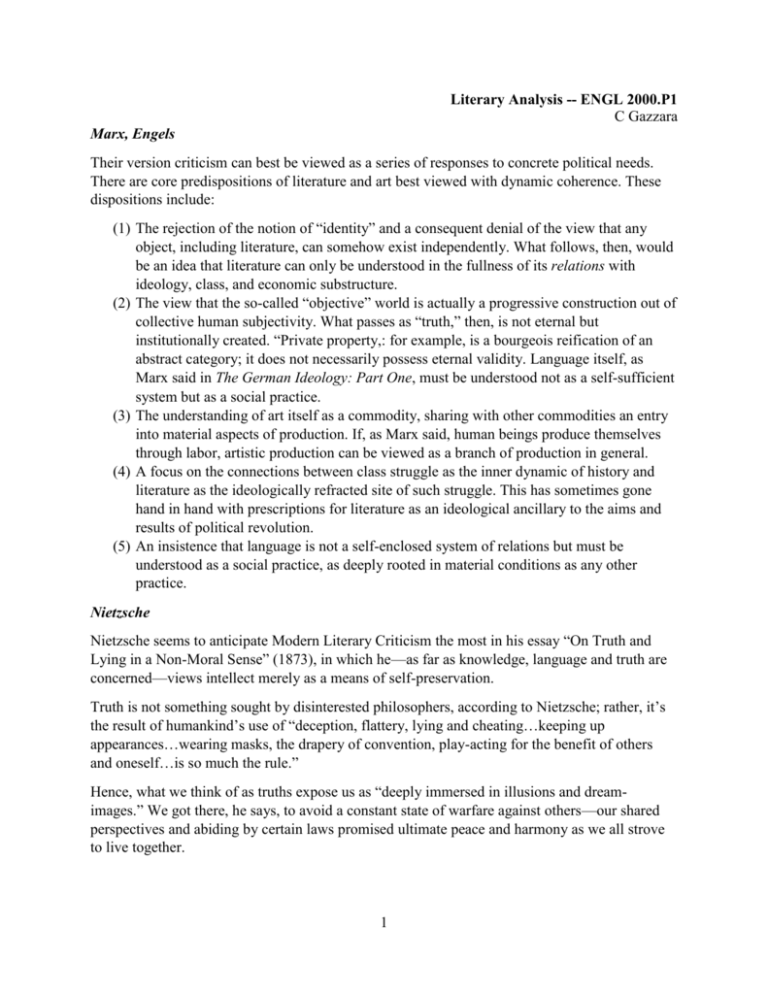
Literary Analysis -- ENGL 2000.P1 C Gazzara Marx, Engels Their version criticism can best be viewed as a series of responses to concrete political needs. There are core predispositions of literature and art best viewed with dynamic coherence. These dispositions include: (1) The rejection of the notion of “identity” and a consequent denial of the view that any object, including literature, can somehow exist independently. What follows, then, would be an idea that literature can only be understood in the fullness of its relations with ideology, class, and economic substructure. (2) The view that the so-called “objective” world is actually a progressive construction out of collective human subjectivity. What passes as “truth,” then, is not eternal but institutionally created. “Private property,: for example, is a bourgeois reification of an abstract category; it does not necessarily possess eternal validity. Language itself, as Marx said in The German Ideology: Part One, must be understood not as a self-sufficient system but as a social practice. (3) The understanding of art itself as a commodity, sharing with other commodities an entry into material aspects of production. If, as Marx said, human beings produce themselves through labor, artistic production can be viewed as a branch of production in general. (4) A focus on the connections between class struggle as the inner dynamic of history and literature as the ideologically refracted site of such struggle. This has sometimes gone hand in hand with prescriptions for literature as an ideological ancillary to the aims and results of political revolution. (5) An insistence that language is not a self-enclosed system of relations but must be understood as a social practice, as deeply rooted in material conditions as any other practice. Nietzsche Nietzsche seems to anticipate Modern Literary Criticism the most in his essay “On Truth and Lying in a Non-Moral Sense” (1873), in which he—as far as knowledge, language and truth are concerned—views intellect merely as a means of self-preservation. Truth is not something sought by disinterested philosophers, according to Nietzsche; rather, it’s the result of humankind’s use of “deception, flattery, lying and cheating…keeping up appearances…wearing masks, the drapery of convention, play-acting for the benefit of others and oneself…is so much the rule.” Hence, what we think of as truths expose us as “deeply immersed in illusions and dreamimages.” We got there, he says, to avoid a constant state of warfare against others—our shared perspectives and abiding by certain laws promised ultimate peace and harmony as we all strove to live together. 1 Truth is, to Nietzsche, “a way of designating things…which has the same validity and force everywhere, and the legislation of language produces the first laws of truth.” More to the point, Nietzsche contends that we’re indifferent to knowledge “if it has no consequences, but [we’re] hostile towards truths which may be harmful or destructive”; in other words, we’re only concerned with truth inasmuch as it creates “pleasant-life-preserving consequences.” It is impossible, to Nietzsche, for truth or knowledge to be pursued free from a broad range of motives: self-preservation, promotion, or motives rooted in ideology, economics, and the desire for power. Marx/Engels would seem to anticipate this, given their belief that language is a practical activity brought about by material needs of humans; truth, furthermore, would be seen by all as made possible by structures of ideology and politics. Philosophers would not work from the essence of things, as far as language is concerned; indeed, per Nietzsche, language FALSIFIES the nature of our experience. Our “unique, utterly individualized experience[s]” of given entities are forgotten when we all—through the TRUTHtalk explained above—agree to stamp the same word on them. What ends up happening here is falsifying, what Nietzsche calls applying a concept to “countless other, more or less similar cases, i.e. cases which, strictly speaking, are never equivalent, and thus nothing more than non-equivalent cases.” This falsifying happens in two ways: 1. We’re forcing two unique circumstances under the same category, thus removing the uniqueness of each; and 2. We’re focusing on singularity of these circumstances, not celebrating their differences. Think of leaves—if each one on all the trees right now was considered its own unique manifestation of nature, what are depriving each by calling all of them the same, lazy word: leaf? In this way, we’re collectively self-delusive—each generation will “inherit” the practiced words used, despite these falsifications, as though they were natural, true, and the only way to represent experience. Think, then, of how we arbitrarily construct experiences by which we interpret new experiences. Think, too, of how problematic it is to view concepts such as “Jewish,” “blackness,” “femininity,” or “Islam” as the root causes of how black, Jewish, feminine, or Muslim people ACTED. “Only because man forgets himself as a subject and indeed as an artistically-creative subject, does he live with some degree of peace, security, and consistency.” 2


